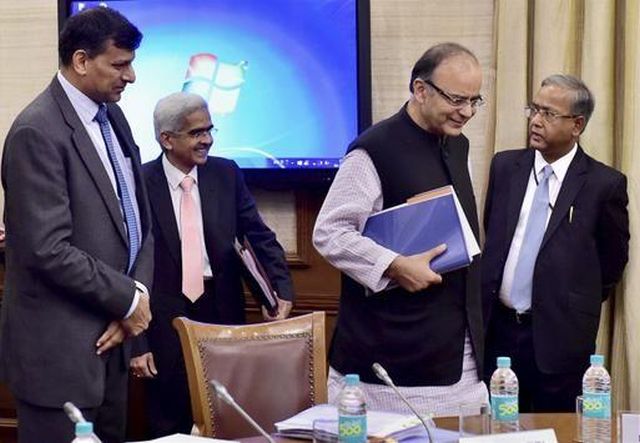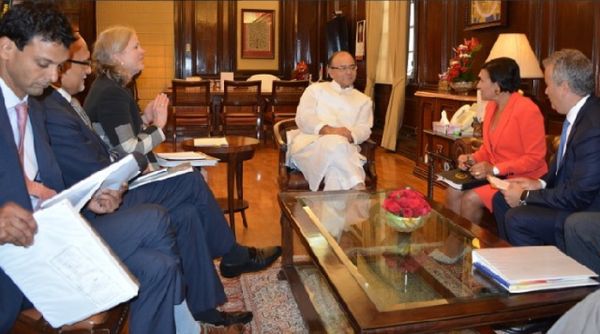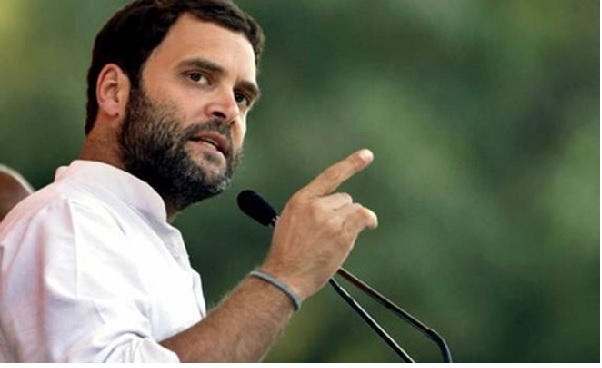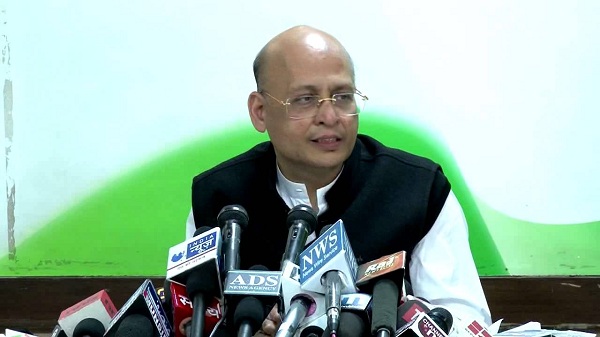
by Editor | May 25, 2021 | Corporate, Corporate finance, Corporate Governance, Economy, News, Politics
 New Delhi : India has macro-economic stability on the back of structural reforms like GST and the long term positive impact of demonetisation, with the financial markets expressing confidence through high-stock valuations, the Financial Stability and Development Council (FSDC) noted in its meeting held on Tuesday.
New Delhi : India has macro-economic stability on the back of structural reforms like GST and the long term positive impact of demonetisation, with the financial markets expressing confidence through high-stock valuations, the Financial Stability and Development Council (FSDC) noted in its meeting held on Tuesday.
The 17th meeting of the FSDC was held here under the chairmanship of Finance Minister Arun Jaitley.
“The Council noted that India has macro-economic stability today on the back of improvements in its macro-economic fundamentals, structural reforms with the launch of the Goods and Services Tax (GST), action being taken to address the Twin Balance Sheet (TBS) challenge, extraordinary financial market confidence, reflected in high and rising bond and especially stock valuations and long-term positive consequences of demonetisation,” the Finance Ministry said in a statement.
It also deliberated on strengthening the regulation of the Credit Rating Agencies (CRAs).
The Council also discussed the issues and challenges facing the Indian economy and the members agreed on the need to keep constant vigil and be in a state of preparedness for managing any external and internal vulnerabilities.
It also took note of the progress of financial sector assessment programme for India, jointly conducted by the International Monetary Fund and the World Bank.
“The Council directed that the assessment report should be finalised by the end of this year,” it said.
A presentation on the state of economy was made by Chief Economic Adviser (CEA) Arvind Subramanian.
The meeting was attended by Reserve Bank of India Governor Urjit R. Patel, Finance Secretary Ashok Lavasa, Economic Affairs Secretary Subhash Chandra Garg, Financial Services Secretary Anjuly Chib Duggal, Ministry of Corporate Affairs Secretary Tapan Ray, Ministry of Electronics and Information Technology Secretary Ajay Prakash Sawhney, Securities and Exchange Board of India (Sebi) Chairman Ajay Tyagi, Insurance Regulatory and Development Authority of India (IRDAI) Chairman T.S. Vijayan, Pension Fund Regulatory and Development Authority (PFRDA) Chairman Hemant G. Contractor and other senior officers of the government and financial sector regulators.
FSDC took note of the developments and progress made in setting up of Computer Emergency Response Team in the Financial Sector (CERT-Fin) and Financial Data Management Centre and discussed measures for time bound implementation of the institution building initiative.
A brief report on the activities undertaken by the FSDC sub-committee chaired by the RBI Governor was placed before the Council.
It also undertook a comprehensive review of the action taken by members on the decisions taken in earlier meetings of the Council.
The Central KYC Registry (CKYCR) system was also discussed and the Council took note of the initiatives taken in this regard by the members and discussed the issues/suggestions in respect of its operationalisation.
—IANS

by Editor | May 25, 2021 | Corporate, Corporate finance, Corporate Governance, News, Politics
 Mumbai : Finance Minister Arun Jaitley said on Saturday that while previous laws were only partly effective in resolving the problems of insolvency and bankruptcy in the corporate world, one would have to wait to judge the effectiveness of the current mechanism to deal with the issue.
Mumbai : Finance Minister Arun Jaitley said on Saturday that while previous laws were only partly effective in resolving the problems of insolvency and bankruptcy in the corporate world, one would have to wait to judge the effectiveness of the current mechanism to deal with the issue.
“Earlier, if companies were for insolvency, they got stuck in courts indefinitely. The SICA merely provided an ‘Iron Curtain’ against debtors, otherwise it was an absolute failure and could achieve very little of the purpose for which it was created,” Jaitley said.
The Debts Recovery Tribunal (DRT) was somewhat faster, but not as effective as envisaged, while the Sick Industrial Companies Act (SICA) failed and the Securitisation and Reconstruction of Financial Assets and Enforcement of Security Interest Act (SARFAESI) served a limited purpose since being a creditor inherently put one at a disadvantage under it, he said.
The issue is being currently addressed by the Insolvency and Bankruptcy Board of India (IBBI).
It will facilitate a better understanding of intricacies of the Insolvency and Bankruptcy Code, 2016 (‘Code’), share the experiences gained during the initial nine months and also discuss the challenges that need to be overcome, the Finance Minister added.
Jaitley made the remarks while addressing the National Conference on Insolvency and Bankruptcy: Changing Paradigm, organised by the Ministry of Corporate Insolvency and Bankruptcy Board of India.
—IANS

by Editor | May 25, 2021 | Economy, News
 New Delhi : (IANS) Finance Minister Arun Jaitley on Monday took a jibe at Congress vice president Rahul Gandhi’s recent ‘Fair and Lovely Yojana’ comment, saying it was politically incorrect.
New Delhi : (IANS) Finance Minister Arun Jaitley on Monday took a jibe at Congress vice president Rahul Gandhi’s recent ‘Fair and Lovely Yojana’ comment, saying it was politically incorrect.
“I have heard the phrase. It is politically incorrect. It shows racial mindset. World over people frown at such phrases. I will pass it off as ignorance,” Jaitley said while replying on the budget debate in the Lok Sabha.
Earlier this month, Gandhi said the present National Democratic Alliance government has “launched a Fair and Lovely Yojana, to convert black money to white money”.
Jaitley further defended his policy, saying his scheme to let people pay no penalty, interest on pending tax disputes, was neither an amnesty nor a Voluntary Disclosure of Income Scheme.

by Editor | May 25, 2021 | Economy, News

Congress spokesperson Abhishek Singhvi
New Delhi:(IANS) The Congress on Tuesday said the ruling BJP was trying to project that non-passage of GST Bill was a reason for the government’s “poor performance” and cover up its “economic failures” by blaming the opposition.
Talking to media persons here, Congress spokesperson Abhishek Singhvi took digs at Finance Minister Arun Jaitley over government’s efforts to push the Goods and Services Tax (GST) bill, noting that the legislation was “stalled during the previous United Progressive Alliance government”.
“Arun Jaitley finds GST in much public interest. This has dawned after seven years,” he said.
“As the session draws to a close, the obduracy and obstinacy of the government is matched only by the studied silence of the prime minister. We are happy that the BJP, the prime minister and Arun Jaitley, are finding the GST to be so much in the public interest.”
Citing Index of Industrial Production data for May, Singhvi said it the government’s performance was quite low on parameters such as factory output and capital goods growth compared to data for May last year.
“You (government) are really trying to create confusion to cover up economic failures,” he said.
Noting Congress’ opposition to some provisions of the GST bill was based on national interest, Singhvi said among the issues of difference was that Congress wanted an independent body to resolve disputes between states but the government had left the task to the GST council itself.
“We want that GST should come in an effective way,” he said.
“One of the objections is that the rate must have a limitation, a ceiling. It can be 15 percent, it can be 18 percent.
“Another issue which we raised was that when there is a dispute between the states, as is very likely, you must create an independent resolution body.
“This is common sense. The government obdurately and obstinately insists that the Dispute Resolution Body should be the GST council itself,” Singhvi added.
He contended that the parliament was facing a stalemate due to “obduracy of the government and silence of Prime Minister Narendra Modi”.
Asked if the party had changed its stance of seeking resignations of three Bharatiya Janata Party (BJP) leaders to a discussion under adjournment motion in the Lok Sabha, he said the Congress wanted an adjournment motion as it could lead to censure.
Congress leaders said there was no change in the party’s stance.
They said since their demand for adjournment motion was not being accepted, they have been maintaining that discussion under other rules can take place after the BJP leaders resign.
The Congress and some parties are demanding the resignation of External Affairs Minister Sushma Swaraj and Rajasthan Chief Minister Vasundhara Raje over their alleged help to former IPL chief Lalit Modi, who is facing an Enforcement Directorate investigation, and of Madhya Pradesh Chief Minister Shivraj Singh Chouhan over the Vyapam scam.

 New Delhi : India has macro-economic stability on the back of structural reforms like GST and the long term positive impact of demonetisation, with the financial markets expressing confidence through high-stock valuations, the Financial Stability and Development Council (FSDC) noted in its meeting held on Tuesday.
New Delhi : India has macro-economic stability on the back of structural reforms like GST and the long term positive impact of demonetisation, with the financial markets expressing confidence through high-stock valuations, the Financial Stability and Development Council (FSDC) noted in its meeting held on Tuesday.


